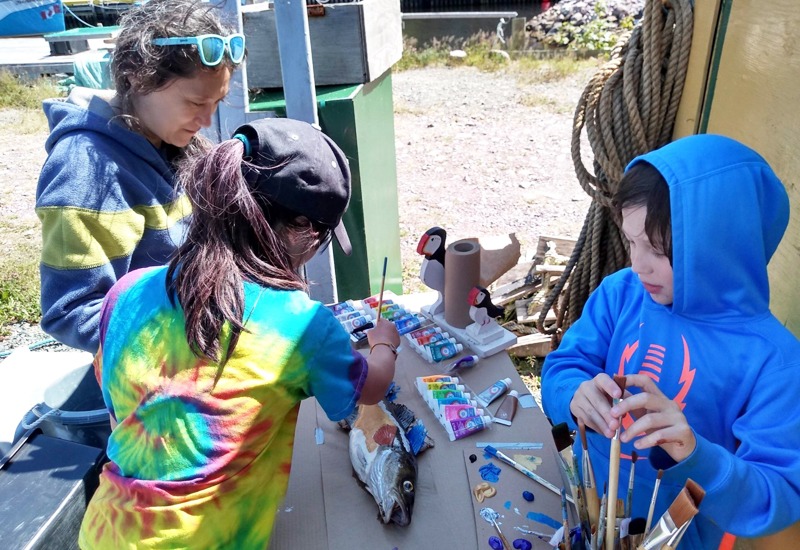Fish by fish

You could say that the linkages between Memorial University and Fishing for Success run as deep as the water just beyond Petty Harbour.
The thriving fishing community is home to the social enterprise that teaches traditional fisheries skills while helping participants develop purpose, confidence and a sense of belonging.
A collaboration between Fishing for Success, and Dr. John Schouten, a professor of social enterprise with Memorial’s Faculty of Business Administration, has been awarded Memorial’s highest honour for public engagement, the President’s Award for Public Engagement Partnerships.
Learning by doing
Fishing for Success founders Kimberly Orren and Leo Hearn have a strong belief in the power of the sea to create opportunity.
Their programs introduce youth, women and new Canadians (as well as tourists who help pay the bills!) to traditional practices like fishing and boat building. Participants gain skills but also new ideas about their own abilities.
“Sometimes we measure success by whether a new skill will get a job for someone but often, it’s more about the mindset that it helps them develop,” explained Ms. Orren. “Will it encourage them to be able to take and manage risk and try new things?”
For example, program participants have helped to build a number of fishing stages in Petty Harbour. They’re part of the infrastructure of the community now, and represent a sense of connection and capability for the young people who helped erect them.
Whether or not those youth end up building another fishing stage down the line, the experiences create trust in their abilities to learn and do.
“Twenty years ago we didn’t know that social media influencer would be a job,” said Ms. Orren. “I don’t know what jobs will look like 20 years from now, but I want to help kids build confidence so that they feel ready to take on whatever comes along.”
Meaningful partnership
When Ms. Orren and Mr. Hearn met Dr. Schouten at a Memorial-hosted event several years ago, they clicked right away.
As the new Canada Research Chair (Tier 1) in Social Enterprise, he was fascinated by their work, and soon began collaborating with the pair.
Before long, Dr. Schouten made Fishing for Success the focus of his research. Soon after that, he was looking for a real estate agent. “
I live two houses down from Kimberly and Leo. [Petty Harbour is] a wonderful place,” he said. “I wanted to be able to be there as often as possible to really understand the operations and the personalities.”
Measuring impact
When Ms. Orren and Mr. Hearn started Fishing for Success, they decided to take a social enterprise approach because they didn’t see much potential for external funding.
“Funders don’t like to take risk, and I don’t mean financial, I mean kids with knives cutting out cod tongues!” Ms. Orren said. “Running tours for tourists was a way for us to support our project.”
Part of the partnership between Fishing for Success and Dr. Schouten has focused on understanding the myriad impacts of the program on various stakeholders, including program participants, employees, tourists and the community itself.
“What we’re seeing, not just with employees, is that Fishing for Success has introduced people to an interpretation of Newfoundland and Labrador culture that takes from deep traditions and updates them to make them relevant to young people today,” said Dr. Schouten.
Another impact that has emerged relates to developing a sense of belonging, both in local youth and newcomers who participate in programming though a partnership with the Association for New Canadians (ANC).
“We have ANC women and their children come out and there is great anecdotal evidence that this has reduced women’s need for social supports,” said Ms. Orren. “They are more employable and they make friends.”
Both Ms. Orren and Dr. Schouten feel that their partnership is mutually beneficial.
Dr. Schouten is able to access a research site that continues to evolve and grow, and Fishing for Success can quantify the impact of its work, a key element in conversations with decision-makers, including governments.
As Ms. Orren explained: “You need to show you’re making an impact, but I don’t have time to do that research and write those reports. My partnerships with Memorial have helped with that.”
The relationship has also been a site for Dr. Schouten’s research on how to determine “impact” in the context of social enterprise.
“The kinds of benefits that Fishing for Success is good at providing are soft benefits that are hard to measure,” he said. “We’re figuring out how to demonstrate impact when it isn’t strictly financial. In a situation like this, money is not the object, it’s just a necessary tool.”
Unlimited potential
The collaboration between Fishing for Success and Memorial doesn’t end there.
It extends to multiple departments, centres and researchers, and addresses issues like sustainability, gender equity and food sovereignty.
As the province looks to new opportunities to sustain its communities in the future, partnerships like the one between Ms. Orren, Mr. Hearn and Dr. Schouten emphasize that the skills and knowledge of the past are still useful today.
Fishing, building and finding food are some of the earliest human skills, and the lessons that they can teach are as relevant now as ever.
“When you’re out on the water, there’s something revitalizing about it and it’s something our young people need to experience,” Ms. Orren said.